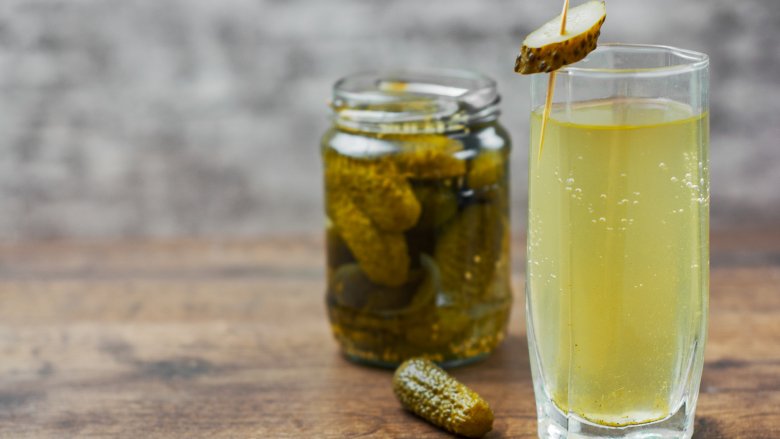Here's Why You Shouldn't Throw Out Leftover Pickle Juice
If you're anything like celebrity chef Alex Guarnaschelli, you have a lot of pickles in your fridge. (Seriously. She has jars and jars of pickles in her home kitchen, and that's exactly what should be in a fridge.)
Most of us probably eat the pickles and dump the juice. Maybe, if we're feeling extra resourceful, we might refill the jar a time or two with some sliced carrots, beets, or a few pieces of garlic left over from cooking. You can definitely do that — and you can even get super creative and use it for things like eggs, avocado, artichokes, radishes, or green beans. Waste not, want not.
But there are other reasons you shouldn't be in a hurry to dump out that jar of pickle juice, and you should absolutely start thinking of it as just as much a legitimate food item as the pickles themselves. Did you know that pickle juice has been proven to have some serious health benefits to those who drink it? It might sound like one of those weird, super-trendy things people in the know just kind of do, but it's not just a fad.
According to Healthline, there are some scientifically proven ways drinking pickle juice is actually good for you, and it'll pay to keep those jars in the fridge long after the actual pickles are gone — especially if you're making it a point to exercise more. That's because research done through a joint study between North Dakota State University and Brigham Young University found (via Medicine & Science In Sports & Exercise) that pickle juice was surprisingly good at rehydrating the body after exercise, and was one of the best ways to reduce cramping. They also found that for people who were putting themselves through strenuous or long workouts (especially in hot temperatures), pickle juice worked way better than water when it came to replenishing liquids lost through sweating.
They surmise it has something to do with the combination of sodium and vinegar found in most pickles, and while that means you might not want to chug that entire jar if you're on a low-sodium diet, it also means you just might be able to fill that reusable water bottle with something super effective. Bonus? It's not going to negate all the hard work you just did, as it's fat free and — if you choose your pickles wisely — can be low-calorie. It's also cheaper than any of those trendy sports drinks you can get, especially because you were going to buy or make pickles anyway, right?
There's some other good news here, too. The vinegar in that pickle juice has also been linked to making weight loss efforts much more successful, to helping regulate blood sugar levels, and keeping your digestive system happy by maintaining a healthy balance of good bacteria in your stomach. And that's a big deal — according to VeryWell Health, gut flora impacts everything from our immune systems to keeping our metabolism on track. Pickle juice is also great because most varieties contain valuable antioxidants — specifically vitamins C and E — and those are going to help boost your immune system, too. Cold and flu season doesn't stand a chance against your favorite refrigerator pickles.
And finally — strangely — this potent juice can also help freshen your breath. Weird, right? You can thank the antibacterial properties of dill and vinegar for this one... even though you might still never think to reach for a pickle before you head out on a date.
While there's no scientific evidence to back up this one, it's worth mentioning that pickle juice is also part of a long-held folk remedy. According to Medical News Today, pickle juice will help draw the heat and pain out of a sunburn.
If you're shocked that pickle juice has so much going for it, you're definitely not alone. So, here's the next question: What if you can't quite bring yourself to just chug it straight? The next time a recipe calls for apple cider or white vinegar, try swapping in pickle juice. It works great in things like salad dressing, barbecue sauce, steak or chicken marinades, and tartar sauce. Oh, and the next time you're boiling potatoes? Use some pickle juice for a completely new flavor.
But are all pickle juices are created equal? Not quite. Healthline says there's a few things you should look for if you're planning on putting that pickle juice to good use, and the first is figuring out whether or not they were fermented. Fermented foods will give you some added benefits — they're an anti-inflammatory, immune system booster, and digestive aid — otherwise, if your pickles aren't fermented, you're still getting all the good stuff that comes from the vinegar. They also suggest that you might want to consider reaching for dill pickles. That's because the dill in that juice has been linked to lowering cholesterol, and that might just be the tastiest way to fight heart disease we've ever heard of.
